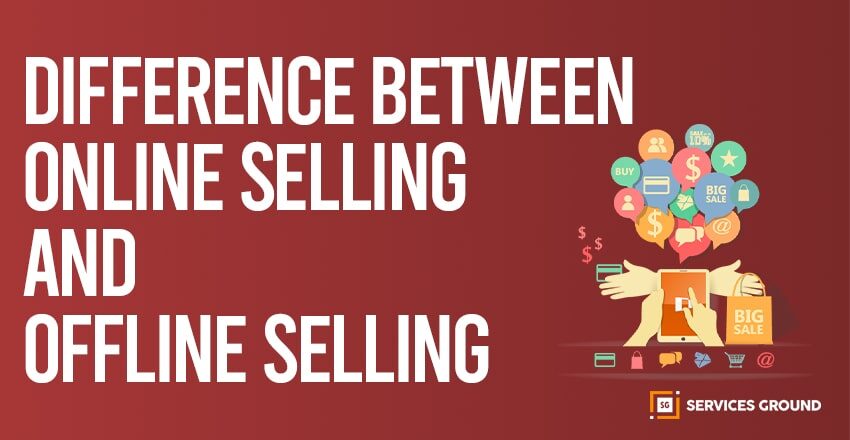What is Online Selling?

Online selling is a form of e-commerce business that allows people to buy products and services online from the seller, through a web browser over the internet.
What is Offline Selling?

A form of a business model that allows people to purchase goods and services through a business outlet, who has a physical location.
Let’s discuss some major differences between Online Selling and Offline Selling that help you to make decisions if you are interested in starting a new business.
1. Customer Reach
- Offline Selling: In offline selling, customer reach will be limited. Because in this business model you have a physical outlet with one or more locations. Your customers will be the native people.
- Online Selling: While in online selling, customers will reach you globally. Because in this business model you have an online store, and customers can search you from anywhere in the world using a web browser.
2. Cost of Setup

- Offline Selling: When you think to start an offline business, you must have to buy or rent a space to make an outlet. You have to hire salespersons, you need furniture, manpower for maintenance or so on. The cost of the setup is more.
- Online Selling: For online selling, you don’t need a physical store. You just need an online store for selling, you sign up on the marketplace and pay some amount for registration. The setup cost for online selling is less.
3. Operation Cost
- Offline Selling: For physical outlets, the operational cost will be more. You have to pay rent monthly if you rented a space, maintenance cost of the store, salaries of manpower, electricity bills, etc.
- Online Selling: For online stores, you have some expenses as well. You have to pay a maintenance cost of web hosting which is almost 30$ per month. You have to pay a small amount as you are working in the world’s largest marketplace.
4. Availability
- Offline Selling: In a physical outlet availability is limited. You set your working hours and days.
- Online Selling: While in online selling, the availability of stores is 24/7.
5. Feasibility to Operate
- Offline Selling: You can only operate from the store. For selling products to the customers you need to be feasible at the store.
- Online Selling: Online stores can be operated anytime and from anywhere.
6. Promotion/Marketing
- Offline Selling: For this type of business you have limited marketing options and possibilities.
- Online Selling: In an online business you have a huge range of marketing and promotions features and tools.
7. Business Expansion

- Offline Selling: For offline or physical stores, you can expand your business locally or maximum to some regions.
- Online Selling: But for the online stores, you can expand your business worldwide.
8. Customer Retention:
- Offline Selling: In an offline business, it is easy to retain loyal customers. Because you have customers’ physical support.
- Online Selling: It is comparatively difficult to retain customers at online stores. In online selling, customer support is virtual.
9. Refund Rate

- Offline Selling: In this type of business, the refund/return rate is less. Because customers have physical access to the store, they can try or observe the products before they buy them.
- Online Selling: The refund/return rate of the products is high in online selling.
10. Multi-channel Selling
- Offline Selling: A seller cannot sell his products on multiple channels.
- Online Selling: A seller can sell his products on multiple channels like Amazon, eBay, and many more like this.
11. Brand Visibility and Development

- Offline Selling: A seller’s product is visible to a limited audience and it takes more time to develop as a brand.
- Online Selling: In this business model you are working globally. So products are visible on a larger scale and have the potential to become a brand in fewer months as compare to offline selling.
12. Employees Headcount

- Offline Selling: This business surely needs more employees to manage the store.
- Online Selling: While for online stores, fewer employees are required to manage work online and remotely.
13. Sales Channel
- Offline Selling: For marketing, you can use limited sales channels like radio and print advertising.
- Online Selling: In online business, you may sell products on different multi-channel on social media by email marketing and messaging apps, etc.
14. Performance Analysis

- Offline Selling: To analyze the performance of an offline store you need more time and it is complicated.
- Online Selling: For an online business, stats and figures are updated in real-time. So performance analysis is easier.
15. Trustworthy

- Offline Selling: In this business, you can gain mouth-to-mouth popularity that builds trust. It is more significant but on a less reach.
- Online Selling: In online business, you may get reviews globally, that can help you in building more trust. And better social media feedback may help you to resolve problems.
Thanks For Reading.
If you liked this article and want to read more of these, please subscribe to our newsletter and follow us on Facebook, Youtube, Linkedin, and Twitter.













